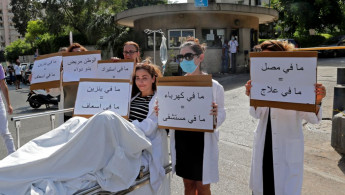'God help us': Lebanese patients 'facing imminent danger' amid fuel crisis
An "imminent danger" faces those receiving care in hospitals in two parts of Lebanon, a medical union in the country has cautioned.
There is fuel available for just two days of operations in the majority of locations in Tripoli and Zahrani, the Syndicate of Hospitals in Lebanon (SHL) said in a release posted on Facebook Wednesday.
However, the situation is worse still at one site, where just a day's reserves were said to be left, though no Friday update was available.
"We are facing an imminent danger that directly threatens the lives of patients," SHL explained.
"It seems the state is unable to do anything. God help us."
Health Minister Hamad Hasan said on Wednesday the World Bank is to provide $25 million for healthcare in Lebanon, according to the official National News Agency.
During a Beirut gathering attended by officials and arranged by Shia-majority parties Amal and Hezbollah, he indicated: "We have won the trust of the World Bank and the international institutions."
"[A]n amount of $25 million will be allocated to purchase medicines for chronic and terminal illnesses and these will be accessible to all, in addition to equipping three government hospitals: Akkar – Jabal Akroum, North Beqaa, Deir Al-Qamar", he continued.
Features: Hospitals in Lebanon have now become a luxury people can not afford. Many are charging high deposits or have limited the number of empty beds - Dana Hourany reports https://t.co/DTTLemlwku
— The New Arab (@The_NewArab) August 26, 2021
Lebanon's hospitals are currently facing a dual crisis: a serious lack of fuel, which is plaguing the nation with power outages and generating eyewatering energy costs, and a dearth of crucial drugs.
This comes amid a broader economic disaster for the country, which started in 2019.
Poverty levels have soared while the country's currency has nosedived by 90 percent of its black-market worth by March amid the collapse.





 Follow the Middle East's top stories in English at The New Arab on Google News
Follow the Middle East's top stories in English at The New Arab on Google News


